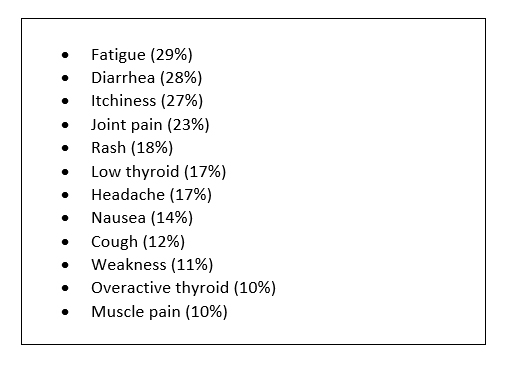
Table Of Contents
- Options for Stage II Melanoma: Making the Decision That’s Right For You
- What is Stage II melanoma?
- Is Stage II melanoma at high risk for coming back (recurring)?
- It is true that Stage II melanoma can have a worse prognosis than Stage III melanoma?
- How can I lower the risk of Stage II melanoma coming back? What adjuvant drugs are used?
- What are the side effects of adjuvant therapy?
- How is adjuvant therapy given?
- How do you weigh the benefits and risks of adjuvant therapy vs active surveillance?
- What do you tell patients who have Stage IIA melanoma and are worried about their risk for recurrence?
Dr. Geoffrey Lim: Can you please go over the side effects of adjuvant therapy used in patients with Stage II melanoma?
Dr. Jason Luke: No treatment in medicine comes without risk. The most common side effects that patients experience with pembrolizumab are shown in the graphic. Some of these are related to the immune system being activated. And, based on our experience with pembrolizumab overall, we commonly quote this risk of about five to ten percent of patients who can have a serious autoimmune-like problem, where their own immune system will attack their organs. And that most commonly is a problem in the organs that make hormones. So, think about the thyroid as being the predominant site affected, but we can also observe changes in the pancreas, the adrenal gland, and other organs. And the reason for that is these drugs cause the organs to not work properly, and then the hormone levels go outside the normal range. And when this happens, one’s hormone levels don’t always fix themselves after you come off the drug.
People most often have low thyroid (or hypothyroidism), and that’s something people have for their entire lives. But it’s not terribly hard to manage, because we can give oral thyroid medicine, which is a relatively easy treatment. That can happen in even up to 20% of patients. So, these drugs can cause something like that, but in more severe cases they can affect other glands, causing other hormones to get out of balance or cause other irregularities. These other hormonal side effects can be more problematic. For example, diseases like type I diabetes mellitus and pituitary problems are more challenging to manage medically and can generally affect the patient’s general health to a greater extent than hypothyroidism. And so, this is a real consideration in terms of the tradeoff.

Graphic. Common side effects (occurring in more than 10% of cases) associated with pembrolizumab in the clinical trial that studied adjuvant therapy in patients with Stage IIB or Stage IIC melanoma. These side effects are listed in descending order from the most common to the least common. For additional information regarding this study, click here.
You can find additional information about the side effects of pembrolizumab by clicking here.
Summary
Immune-related side effects have been reported in clinical trials that studied immunotherapy extensively. They are related to the immune system being overly activated and attacking the body. Some of these side effects can’t be reversed.
Weighing the potential side effects against the benefit is a challenge because you are taking an otherwise relatively healthy person and exposing them to these side effects to prevent something from coming back. We don’t know which patients are going to have the cancer come back.
Suggested Reading
Clinical trials.gov. Safety and efficacy of pembrolizumab compared to placebo in resected high-risk Stage II Melanoma (MK-3475-716/KEYNOTE-716).
Chalan P, Di Dalmazi G, Pani F, De Remigis A, Corsello A, Caturegli P. Thyroid dysfunctions secondary to cancer immunotherapy. J Endocrinol Invest. 2018 Jun;41(6):625-638. doi:10.1007/s40618-017-0778-8
Khan S, Gerber DE. Autoimmunity, checkpoint inhibitor therapy and immune-related adverse events: A review. Semin Cancer Biol. 2020 Aug;64:93-101. doi:10.1016/j.semcancer.2019.06.012. Epub 2019 Jul 19. PMID: 31330185; PMCID: PMC6980444
Luke JJ, Rutkowski P, Queirolo P, et al. Pembrolizumab versus placebo as adjuvant therapy in completely resected stage IIB or IIC melanoma (KEYNOTE-716): a randomised, double-blind, phase 3 trial. Lancet. 2022;399(10336):1718-1729. doi:10.1016/S0140-6736(22)00562-1
